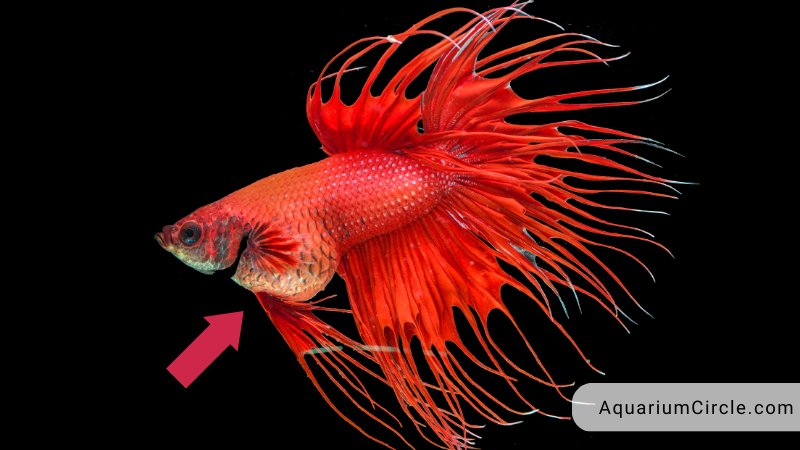Betta fish, also known as siamese fighting fish, are a popular species of freshwater fish known for their vibrant colors and long, flowing fins. However, like any other living creature, they are susceptible to various health conditions that can affect their overall well-being. One such condition is Betta fish bloated, which is characterized by a swollen abdomen that makes the fish appear bigger than usual. Betta fish bloated can be caused by various factors, including overfeeding, constipation, swim bladder disease, internal parasites, or dropsy.
In this blog post, we will discuss the causes, symptoms, treatment, and prevention of Betta fish bloated to help you better understand this condition and provide the best care for your Betta fish.
See also:
- Swim Bladder Disease Betta – Betta Care To Be Aware Of
- Clamped Fins Betta – 5 Truths Keep You Calm To Deal With It
- Betta Fish Fins Look Ripped: Top Reasons & Magic Tips To Treat
Symptoms Of Bloated Betta Fish
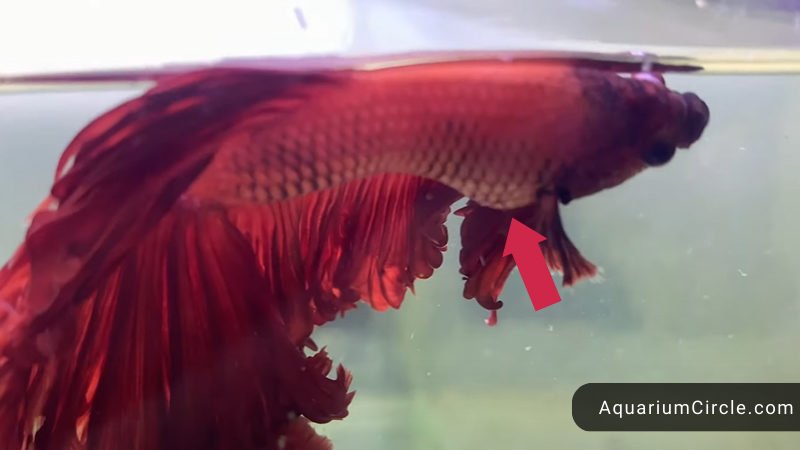
Betta fish bloat can be detected early on before the abdomen becomes visibly enlarged and causes discomfort to the fish. There are several indicators of bloat other than a swollen belly and an abnormal curvature of the spine that can help diagnose the condition.
Loss of appetite
In case you observe that your Betta is eating more or less than usual, it could indicate an underlying reason for this shift in appetite.
Many fish keepers have reported that their Betta fish experience alterations in their appetite before an occurrence of bloat or other comparable health conditions. If you perceive abrupt and significant alterations in your fish’s eating habits, it is important to take note and investigate the underlying cause.
Swimming difficulties
It’s important to monitor your Betta’s movements to detect any changes in behavior. Is your Betta swimming around the tank normally or avoiding unnecessary movement?
If you observe your Betta moving slowly, having difficulty swimming, or showing signs of discomfort when it moves, it may be an early sign of bloat. A bloated Betta fish is usually in pain and may experience difficulty moving due to its enlarged belly.
Mouth and Anus getting swollen
Another potential early indicator to be aware of is if your Betta fish has a swollen mouth or anus. Initially, these regions may appear reddish, but if they become swollen within a day or two, it could be a sign of bloat in your fish. It’s crucial to monitor your Betta fish’s overall appearance and behavior regularly to detect any changes and seek prompt treatment if necessary.
What Are Common Causes Of Betta Fish Bloated?
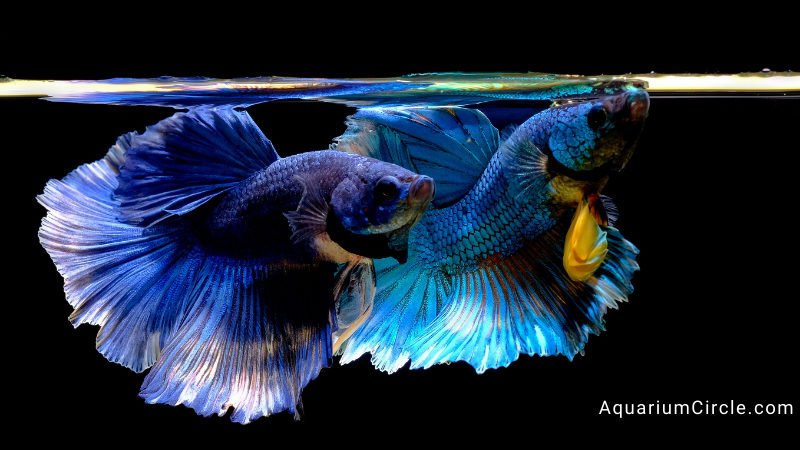
Identifying the cause of bloat in betta fish can be quite challenging since several conditions can lead to a bloated belly. Each condition requires different considerations when it comes to treatment, so it’s essential to identify the exact cause.
Constipation is by far the most common cause of bloat in betta fish, followed by swim bladder disease. These conditions are generally easy to treat, which is good news for pet store owners. However, dropsy is the third most common cause and can have a significant impact on the betta’s internal organs, making recovery a difficult journey.
In the following sections, we will break down the different causes of betta fish bloating and provide guidance on what to do to help your fish recover and return to a healthy state.
Constipation
Thankfully, treating one of the most common cause of bloating in your betta is relatively straightforward. While severe constipation can cause concerning symptoms, your betta fish may recover completely with proper treatment in a short period.
Cause
- Poor diet: Betta fish constipation is often caused by an unbalanced diet lacking sufficient nutrients and fiber, which can challenge their delicate digestive system.
- Poor appetite: Bettas are known for their voracious appetite and should be fed adequately to prevent them from eating inappropriate objects in their tank, leading to constipation and bowel obstruction.
- Lack of physical activity: The betta’s digestive system consists of smooth muscles that require exercise to remain healthy and active. If you keep your betta in a small tank with too many tank mates or without enough space to swim around, it limit their physical activity and lead to constipation.
Symptoms
- Enlarged abdomen: A swollen belly can limit the betta fish’s swimming ability and lead to breathing difficulties.
- Changes in appetite: Betta fish have a constant appetite and require a steady supply of food throughout the day. If you notice that your betta fish has suddenly lost interest in food, it could be a sign that something is wrong. This is especially true if you are providing the same high-quality food as usual, but your fish still refuses to eat.
- Reduced waste: Constipated fish may have difficulty passing feces, resulting in stringy waste. However, these can be difficult to spot without prior experience since bettas typically produce small amounts of waste.
Swim bladder disease
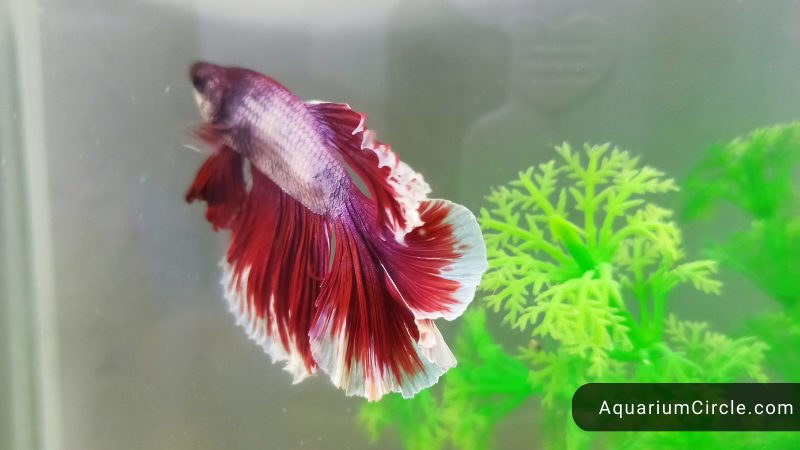
Swim bladder disease is a disorder that occurs when the swim bladder in a betta fish malfunctions. The swim bladder is the organ responsible for regulating the fish’s buoyancy and enabling it to move easily through the water.
Cause
The causes of swim bladder disease can be related to unhealthy eating habits, such as overfeeding, constipation, air swallowing, and rapid eating. These practices expand the betta’s stomach, press on the swim bladder, and limit its capacity.
Granular flake food is also a cause of swim bladder disease, as it expands upon becoming wet and can lead to blockages. Sudden changes in water temperature, lighting conditions, or pH can also cause swim bladder disease, as betta fish are sensitive to changes in their environment.
Other underlying illnesses, such as pregnancy, kidney cysts, and fatty liver, can also cause swim bladder disease by taking up internal space and putting pressure on the swim bladder. Injuries from jumping out of the tank or from aggressive tank mates can also lead to swim bladder dysfunction.
Symptoms
The primary symptom of swim bladder disease is a disruption in the betta fish’s natural buoyancy system, resulting in changes in its ability to move around the tank. You may observe your betta is suffering trouble swimming at the surface or bottom of the tank, which can be problematic as they need to reach the surface to breathe. In severe cases, the disease may also cause physical changes such as a curved back.
Dropsy
Dropsy is a difficult condition to treat unlike constipation and swim bladder disease, and unfortunately, it often results in the death of the affected betta. It is important to keep in mind that any betta with dropsy should be isolated in a quarantine tank to prevent the illness from spreading to other fish in the tank.
Cause
Dropsy occurs due to a bacterial infection that enters the betta fish’s body through its scales and rapidly spreads to the kidneys and liver. This infection interferes with the organs’ ability to remove excess fluid, which leads to edema and bloating.
Symptoms
- Changes in activity and eating patterns: When a betta fish is affected by dropsy, their swimming ability and appetite are likely to be severely affected due to the accumulation of excess fluids in their body.
- Pinecone scales: One of the most noticeable symptoms of dropsy is the pinecone-like appearance of the fish’s scales. The scales appear raised and bumpy, caused by the bloating of the fish’s body due to damage to its internal organs.
Pregnancy
Finally, a bloated stomach is not always a warning symptom in female Bettas. They can either be pregnant or produce unfertilized eggs naturally, which is completely safe and normal. No intervention is required in such cases.
To determine if a female Betta is carrying eggs, look for vertical white stripes running along the length of her body. White spots may also be present on her belly.
See also: How To Breed Betta Fish At Home? Detailed Step-by-step Guide For You
Treatments For Bloat In Betta Fish
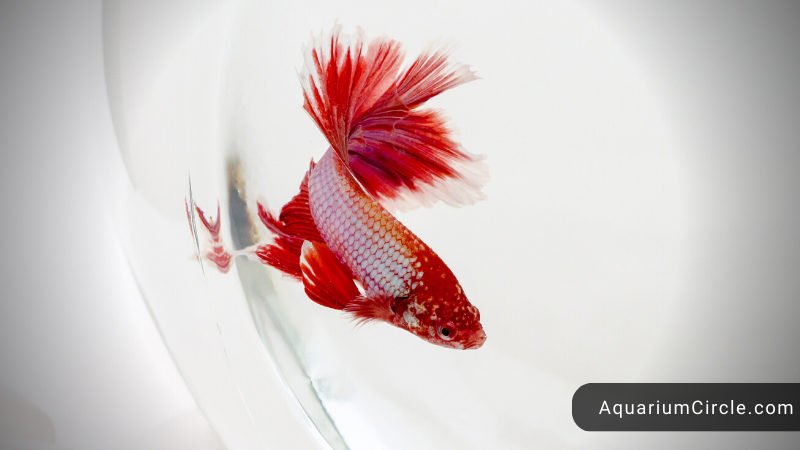
Bloat in betta fish can be a serious condition that requires prompt attention. Here are some potential treatments for bloat in betta fish:
- Fast your betta: One of the first steps you can take is to fast your betta for two days (ideal time) to help reduce any undigested food in their system. This can help to alleviate pressure on the swim bladder and relieve symptoms.
- Epsom salt bath: Adding Epsom salt to the water can help to reduce swelling in the fish’s stomach. This is done by adding 1 teaspoon of Epsom salt per gallon of water and allowing the fish to soak for 10-15 minutes, once a day for up to five days.
- Peas: Feeding the betta fish with cooked peas can help to alleviate constipation and bloating. You should remove the skin and inner membrane of the pea and feed the betta a small piece of the inside of the pea. This can be done once a day for up to three days.
- Medication: If the above steps do not alleviate the symptoms, medication may be necessary. Consult with a veterinarian or a pet store expert to determine the appropriate medication and dosage.
How To Prevent Bloat In Bettas?
There are several ways to prevent bloat in betta fish, including:
- Proper feeding: Feed your betta fish a balanced diet of high-quality pellets or live/frozen foods in appropriate amounts. Avoid overfeeding and limit the amount of dried or flaked food as they can expand and cause bloat.
- Soak pellets: Soak pellets in a cup of water for a few minutes before feeding them to your betta. This will prevent the pellets from expanding in the betta’s stomach and causing bloat.
- Regular water changes: Regular water changes can help prevent the buildup of harmful bacteria in the tank that can lead to digestive problems and bloat. Keep the water temperature and pH level consistent, and avoid sudden changes.
- Avoid over-medicating: Avoid using unnecessary medication in the tank as it can affect the beneficial bacteria in the tank and disrupt the balance.
- Maintain a clean tank: Keep the tank clean by regularly removing uneaten food and debris. Use a filter to keep the water clean and oxygenated.
- Quarantine new fish: Before introducing them to the main tank, quarantine new fish to prevent the spread of diseases and infections.
- Monitor your betta’s behavior and health: Observe your betta regularly for any changes in behavior or health. Early detection and treatment can prevent the development of bloat and other illnesses.
Video About Betta Fish Bloated
FAQs
Is Betta fish bloating fatal?
Betta fish bloating can be fatal if left untreated, especially if it is caused by dropsy or internal parasites. It is important to seek treatment for your Betta fish as soon as you notice any symptoms of bloating.
Can I prevent Betta fish bloating by feeding my Betta less food?
Yes, feeding your Betta fish in moderation can help prevent Betta fish bloating, especially if it is caused by overfeeding or constipation. Be sure to provide a balanced diet that includes both protein and fiber.
How can I tell if my Betta fish is bloated?
You can tell if your Betta fish is bloated if its abdomen appears swollen or if it has difficulty swimming or appears lethargic.
References

Annette M. Chaney is an experienced marine biologist with over 20 years of experience as an aquarist and fishkeeper. She started her first aquarium at a young age, filling it with frogs and goldfish obtained from the ten-cent pet store.
Annette grew up caring for and breeding African Cichlids, which led to a hobby in high school that doubled as a profitable means. Attending Reed College gave her time to solidify herself as an accomplished aquarium caretaker with an eye for sales. After that, from 2009 – 2013, she studied at Roger Williams University – one of the most prestigious universities for Aquaculture and Aquarium in USA. She is the founder of AquariumCircle since 2010.
